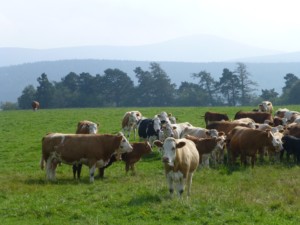With more and more concerning stories emerging regarding the state of our economy following a no-deal Brexit, we are all left wondering what the true impact is going to be come October 31st. If this was a play, we would be unsure as to whether it was a tragedy, a farce or a whodunnit.
The British government’s own financial watchdog has professed that a no-deal Brexit would send Britain into a recession, shrinking the economy by 2% by the end of next year. But what does this mean for UK businesses and, in particular, the Food & Drink sector?
Add to this the political turmoil of the last few weeks and we have even more unknowns than before. What will the election result produce? Will there be another referendum? Will Brexit disappear? Will it be a no-deal?
There are several aspects that need to be considered by businesses in and linked to the Food & Drink sector in the lead up to Brexit.
Scotland’s Food & Drink sector has grown exponentially in the past ten years. The industry is worth more than £14 billion, and exports have more than doubled. Recent statistics suggest that whisky sales make up the bulk of Scotland’s £6.3 billion export sales, with the salmon market following close behind.

Ambitions for 2030 look to double the sector to £30 billion in Scotland, however this will be hugely reliant on the continuation of the export market, and Europe plays a big part in that as the destination of two-thirds of these exports. There is a concern, therefore, that should the UK leave the EU under a no-deal, there will be no more duty-free trading between the UK and EU markets and additional costs and procedures will be introduced on all imports/exports.
The fresh produce and farming industry could be seriously hindered by delays in transport, increased border costs and the obvious risk of food products perishing.
The Food and Drink Federation’s Chief Operating Officer Tim Rycroft told Reuters “…given that food very often is perishable and has a short shelf life, we expect that there will be some selective shortages of food and subsequent price rises in the weeks and months following no-deal Brexit.”
The timing doesn’t help. Halloween is the time of year when the UK increases its food imports to c60%, adding extra pressure to ports and motorways that are likely to be clogged with delayed haulage traffic. Even the preparation that has already been done for dried goods means that the perishable market is likely to suffer most.
 News released recently suggests that farm profitability will be hugely affected should we leave the Brexit under a no-deal. The Andersons Research Centre carried out research on behalf of the BBC to determine how UK farming would be affected and found that “…under a Brexit Deal scenario, a small decline in profitability (3%) is projected; however, under a No-Deal, an 18% decline is forecast.” This amounts to a hit to the sector of around £850 million with the largest effects felt in livestock farms (particularly sheep) and dairy farmers in Northern Ireland. With many already struggling to break even, this could be a catastrophic blow for some farming businesses.
News released recently suggests that farm profitability will be hugely affected should we leave the Brexit under a no-deal. The Andersons Research Centre carried out research on behalf of the BBC to determine how UK farming would be affected and found that “…under a Brexit Deal scenario, a small decline in profitability (3%) is projected; however, under a No-Deal, an 18% decline is forecast.” This amounts to a hit to the sector of around £850 million with the largest effects felt in livestock farms (particularly sheep) and dairy farmers in Northern Ireland. With many already struggling to break even, this could be a catastrophic blow for some farming businesses.
Other issues are more obvious than others. Industries which rely heavily on European labour will find it challenging if they cannot secure the teams to work in the fields, factories and processing plants they need. Local labour has not got the work ethic or skills to step into many of these functions and there is no obvious backfill.
Many other aspects might well have been overlooked. One example is labelling. According to the UK Government there will be strict review of the current and future methods with plenty of changes required. One positive is that a 21-month leniency period has already been agreed whilst the exact details are finalised.
Gove says it will provide opportunities for the sector. The former Tory leadership hopeful noted that “…leaving the EU will open up opportunities for the sector, such as securing new trade deals and making the most of the UK marine environment by leaving the common fisheries policies.” The actual benefit to the Scottish fishing industry is still to be understood but it would appear from recent reports that the European fishing fleet may not adhere very strongly to the UK’s legally protected fishing waters.
The whisky industry has remained generally positive about Brexit, possibly in light of their very global footprint which allows access to other markets and also their ability to weather any transport and supply chain delays. The supply of grain may be their only impending concern although with the right planning this can be circumvented. Their immense importance to both the Scottish and UK economy should not be understated and ensuring the continued growth across the sector should be a priority.
Whilst confusion, losing the will to live and baffling cross-party politics has dominated the last three years, the final curtain is about to fall on this rather shambolic Brexit play. It would appear, whatever the outcome, we will not emerge smelling of roses (they’ll be stuck in Holland) and should expect some short-term pain and, hopefully, long term gain. Whatever the result, lets please not ask for an encore.
Businesses who would like some further advice can access articles provided by the Government and Business Insider


(No Deal) Brexit – who wrote this play?
With more and more concerning stories emerging regarding the state of our economy following a no-deal Brexit, we are all left wondering what the true impact is going to be come October 31st. If this was a play, we would be unsure as to whether it was a tragedy, a farce or a whodunnit.
The British government’s own financial watchdog has professed that a no-deal Brexit would send Britain into a recession, shrinking the economy by 2% by the end of next year. But what does this mean for UK businesses and, in particular, the Food & Drink sector?
Add to this the political turmoil of the last few weeks and we have even more unknowns than before. What will the election result produce? Will there be another referendum? Will Brexit disappear? Will it be a no-deal?
There are several aspects that need to be considered by businesses in and linked to the Food & Drink sector in the lead up to Brexit.
Scotland’s Food & Drink sector has grown exponentially in the past ten years. The industry is worth more than £14 billion, and exports have more than doubled. Recent statistics suggest that whisky sales make up the bulk of Scotland’s £6.3 billion export sales, with the salmon market following close behind.
Ambitions for 2030 look to double the sector to £30 billion in Scotland, however this will be hugely reliant on the continuation of the export market, and Europe plays a big part in that as the destination of two-thirds of these exports. There is a concern, therefore, that should the UK leave the EU under a no-deal, there will be no more duty-free trading between the UK and EU markets and additional costs and procedures will be introduced on all imports/exports.
The fresh produce and farming industry could be seriously hindered by delays in transport, increased border costs and the obvious risk of food products perishing.
The Food and Drink Federation’s Chief Operating Officer Tim Rycroft told Reuters “…given that food very often is perishable and has a short shelf life, we expect that there will be some selective shortages of food and subsequent price rises in the weeks and months following no-deal Brexit.”
The timing doesn’t help. Halloween is the time of year when the UK increases its food imports to c60%, adding extra pressure to ports and motorways that are likely to be clogged with delayed haulage traffic. Even the preparation that has already been done for dried goods means that the perishable market is likely to suffer most.
Other issues are more obvious than others. Industries which rely heavily on European labour will find it challenging if they cannot secure the teams to work in the fields, factories and processing plants they need. Local labour has not got the work ethic or skills to step into many of these functions and there is no obvious backfill.
Many other aspects might well have been overlooked. One example is labelling. According to the UK Government there will be strict review of the current and future methods with plenty of changes required. One positive is that a 21-month leniency period has already been agreed whilst the exact details are finalised.
Gove says it will provide opportunities for the sector. The former Tory leadership hopeful noted that “…leaving the EU will open up opportunities for the sector, such as securing new trade deals and making the most of the UK marine environment by leaving the common fisheries policies.” The actual benefit to the Scottish fishing industry is still to be understood but it would appear from recent reports that the European fishing fleet may not adhere very strongly to the UK’s legally protected fishing waters.
The whisky industry has remained generally positive about Brexit, possibly in light of their very global footprint which allows access to other markets and also their ability to weather any transport and supply chain delays. The supply of grain may be their only impending concern although with the right planning this can be circumvented. Their immense importance to both the Scottish and UK economy should not be understated and ensuring the continued growth across the sector should be a priority.
Whilst confusion, losing the will to live and baffling cross-party politics has dominated the last three years, the final curtain is about to fall on this rather shambolic Brexit play. It would appear, whatever the outcome, we will not emerge smelling of roses (they’ll be stuck in Holland) and should expect some short-term pain and, hopefully, long term gain. Whatever the result, lets please not ask for an encore.
Businesses who would like some further advice can access articles provided by the Government and Business Insider
Can we help?
If you are looking for leadership advisory or recruitment support, please get in touch with our team of experts.
More Articles...
Livingston James partner with The Scottish Library and Information Council (SLIC) to appoint Chief Executive
The Scottish Library and Information Council (SLIC) is the independent
Livingston James Retained by Denholm Group to Appoint a Marketing & Communications Manager
Founded in 1866, The Denholm Group is a fifth-generation family
Livingston James retained by Scotgrain to appoint new Commercial Manager
Scotgrain is now looking to appoint a new Commercial Manager to manage the successful operation of our Agrochemical and Agronomy business. This is an excellent opportunity for an experienced individual looking to work for a global business with a local feel.